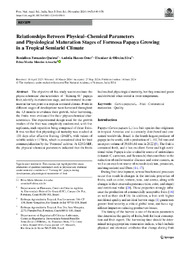Relationships between physical–chemical parameters and physiological maturation stages of formosa papaya growing in a tropical semiarid climate.
Relationships between physical–chemical parameters and physiological maturation stages of formosa papaya growing in a tropical semiarid climate.
Autoria: QUEIROZ, R. F.; OSTER, A. H.; SILVA, E. de O.; AROUCHA, E. M. M.
Resumo: The objective of this study was to evaluate the physicochemical characteristics of ’Tainung 01’ papaya fruit, identify its maturation stage, and recommend its commercial harvest point in a tropical semiarid climate. Fruits in different stages of development were harvested throughout the 4.5 months to evaluate their growth. After harvesting, the fruits were evaluated for their physicochemical characteristics. The experimental design used for the growth studies of the fruit was completely randomized, with five replicates, each repetition being composed of three fruits. It was verified that physiological maturity was reached at 130 days after effective fruiting (DAEF), with values of soluble solids > 11oBrix, which is considered ideal for fruit commercialization by the ’Formosa’ cultivar. At 123 DAEF, the physical–chemical parameters indicated that the fruits had reached physiological maturity, but they remained green and shriveled when stored at room temperature.
Ano de publicação: 2024
Tipo de publicação: Artigo de periódico
Unidade: Embrapa Uva e Vinho
Palavras-chave: Carica papaya L, Commercial maturation, Fruits, Quality
Observações
1 - Por padrão são exibidas publicações dos últimos 20 anos. Para encontrar publicações mais antigas, configure o filtro ano de publicação, colocando o ano a partir do qual você deseja encontrar publicações. O filtro está na coluna da esquerda na busca acima.
2 - Para ler algumas publicações da Embrapa (apenas as que estão em formato ePub), é necessário ter, no celular ou computador, um desses softwares gratuitos. Sistemas Android: Google Play Livros; IOS: iBooks; Windows e Linux: software Calibre.
Acesse outras publicações
Acesse a Base de Dados da Pesquisa Agropecuária (BDPA) para consultar o acervo completo das bibliotecas da Embrapa.

